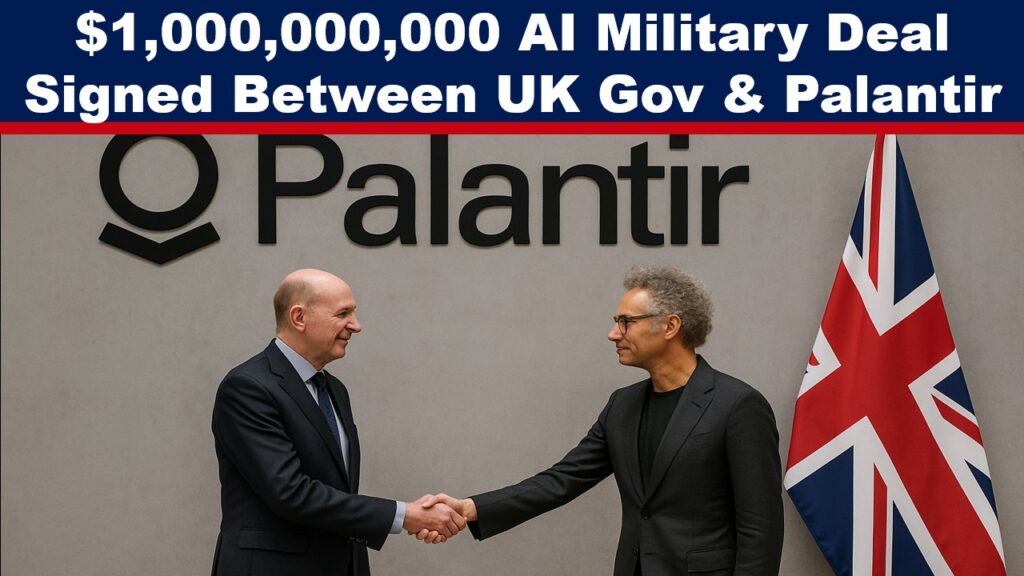
G. CALDER
During President Trump’s recent visit to the UK, Britain signed a $1 billion, five-year defence software deal with dominant AI player Palantir. This “strategic partnership”, in which the AI platform will manage all the country’s armed forces, also promises that the company will base its European defence HQ in London. The stated aim is speed, interoperability, and an end to the patchwork of legacy systems across the Army, Navy, and Royal Air Force.
But there are deeper concerns beneath the surface: the question of Trump’s potential influence over the brokering of the deal; the UK outsourcing total control of its military operational abilities to a US-based company; and the background, motives, and moral record of Palantir itself. Who are they? Where did they come from? What else are they planning to implement in partnership with the UK government?

.
What is Palantir?
The company has recently grown to become the dominant force in AI-enabled decision software. It ingests and links data from sensors, intel holdings, satellites, logistics systems and communications, then orchestrates targeting, planning, tasking, maintenance and surveillance accordingly. The platform can be used in a range of functions, from businesses identifying risk and streamlining supply chains, to governments focusing on defence, policing, immigration, and active warfare.
Ultimately, it can track people, assets, processes, networks, weapons, and everything in between with a cut-throat efficiency we’ve never seen before. The UK is just the first step in an international takeover by Palantir, whose software currently has such a strong moat that there is zero real competition available. The company’s new European defence hub, which will run from London, is a glance into its global targets. The billion-dollar deal with the UK is Palantir’s first ten-figure contract outside the US – and it’s just the beginning.
Who’s Really In Control?
Palantir’s platform is said to only be the decision layer in time-critical operations, meaning the control remains with the government over how to implement it. In terms of creating a faster, cleaner operating procedure, consolidating the UK’s military backbone with one supplier may have its benefits. But concentrating strategic risk in a single foreign vendor whose recent public partnerships include Israel’s Ministry of Defense and front-line Ukraine deployments comes with great risk too.
The Rise of Palantir
Palantir has grown from niche contractor to alliance standard-setter. NATO has already bought its Maven Smart System for Allied Command Operations, and the US Department of Defense recently boosted the contract ceiling by another $795 million citing “growing demand”. The company ($PLTR) has a market cap today of a staggering $414 billion, having grown 1,200% since January 2024. In the past 6 months alone, the stock price has more than doubled. Every day, it seems, the company gains more momentum with stacks of defence and commercial AI wins being reported constantly. The latest with the UK government demonstrates the sheer demand for the software, having grown from deals worth millions to billions in a matter of months.
How Did It Get Here?
It developed its military technology through extensive testing and real-world use. For example:
- Palantir publicly announced a strategic partnership with Israel’s MoD to supply technology to “help the country’s war effort” despite criticism from human rights groups given the civilian harm in Gaza
- Its contracts with the US Immigration and Customs Enforcement (ICE) include a new $30 million “Immigration OS” build for real-time visibility and prioritisation, with civil-liberties organisations arguing its software enables rights-abusive enforcement
- Ukraine has been a showcase for Palantir’s AI-enabled targeting and evidence workflows. Supporters celebrate its precision; critics oppose embedding a private vendor in lethal decision chains
Along with direct involvement in some of the world’s most polarising conflicts, there are also huge concerns with opacity and vendor lock-in. Campaigners warn that Palantir’s closed stack and deep data integration entrenches surveillance and creates dependency once a state’s core workflows move onto the platform – this risk grows exponentially as more allies standardise on the same software.
How Palantir Defends Itself
AIP, Palantir’s main platform, has been labelled an “AI kill-chain” by opponents, alleging “testing on civilians” and framing Palantir as “on Israel’s side”. The company answers that it does not set policy but attempts to enforce human-in-the-loop systems and audit trails, and actually reduces harm by accelerating clarity and precision. On the Israel topic, Palantir says it’s simply supporting an ally’s defence ministry, and in Ukraine it claims to be helping a sovereign state resist invasion. For immigration uses, its defence is that it delivers lawful software inside democratic rules.
What Will the UK Use It For?
The UK’s plan is to replace multiple, legacy suppliers with a single backbone that covers everything from asset management, predictive maintenance and supply-chain visibility, to target development, tasking, operational planning and wargaming. In addition to its end-to-end capabilities, the added coalition interoperability will make Palantir irreplaceable. NATO already uses its platform, and more allies will inevitably jump on board soon.
The big question mark here is scope. What about domestic surveillance? Mass people-tracking? Real-time facial recognition software? Well, it’s certainly capable of it all.
Why This Deal Suits Washington Too
A US-based, government-endorsed company sits at the heart of allies’ decision making, all the way from London to the NATO headquarters. The timing of the agreement with the high-profile state visit this week and a broader US-UK tech pact underlines the diplomatic layer. It would be naive to ignore the strategic logic, that locking in US software across allied militaries solidifies economic and security ties for years to come.
Final Thought
Britain is saying it’s happy to outsource a critical slice of military cognition to a US-based platform in exchange for efficiency. It’s also clearly able to live with the contradiction that, while Starmer calls for a Palestinian state to be recognised, the software that now controls its own military backs Israel’s efforts in Gaza.
Will parliament be able to set hard red lines on data residency and operational scope, or is the plan to allow spillover into tracking the public too?
Join the Conversation
Is this the beginning of the AI analytics takeover of the UK? Many have voiced concerns of digital IDs, facial recognition software and domestic surveillance for years. Or is this simply a streamlining of military operations that won’t affect day-to-day life? Share your thoughts about where we go from here.
This article (UK Govt Signs Billion Dollar AI Military Deal with Palantir) was created and published by The Expose and is republished here under “Fair Use” with attribution to the author G. Calder
Featured image: Getty Images

••••
The Liberty Beacon Project is now expanding at a near exponential rate, and for this we are grateful and excited! But we must also be practical. For 7 years we have not asked for any donations, and have built this project with our own funds as we grew. We are now experiencing ever increasing growing pains due to the large number of websites and projects we represent. So we have just installed donation buttons on our websites and ask that you consider this when you visit them. Nothing is too small. We thank you for all your support and your considerations … (TLB)
••••
Comment Policy: As a privately owned web site, we reserve the right to remove comments that contain spam, advertising, vulgarity, threats of violence, racism, or personal/abusive attacks on other users. This also applies to trolling, the use of more than one alias, or just intentional mischief. Enforcement of this policy is at the discretion of this websites administrators. Repeat offenders may be blocked or permanently banned without prior warning.
••••
Disclaimer: TLB websites contain copyrighted material the use of which has not always been specifically authorized by the copyright owner. We are making such material available to our readers under the provisions of “fair use” in an effort to advance a better understanding of political, health, economic and social issues. The material on this site is distributed without profit to those who have expressed a prior interest in receiving it for research and educational purposes. If you wish to use copyrighted material for purposes other than “fair use” you must request permission from the copyright owner.
••••
Disclaimer: The information and opinions shared are for informational purposes only including, but not limited to, text, graphics, images and other material are not intended as medical advice or instruction. Nothing mentioned is intended to be a substitute for professional medical advice, diagnosis or treatment.
Disclaimer: The views and opinions expressed in this article are those of the author and do not necessarily reflect the official policy or position of The Liberty Beacon Project.






Leave a Reply